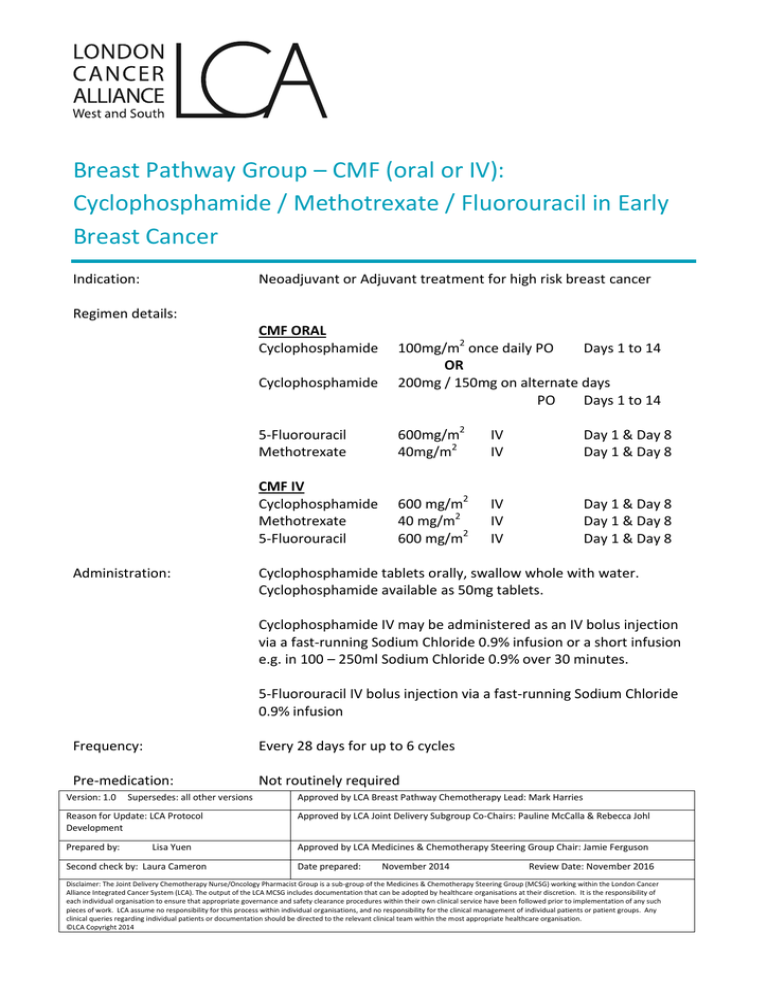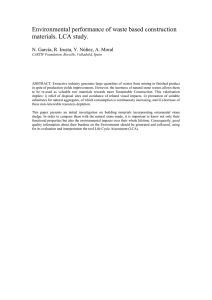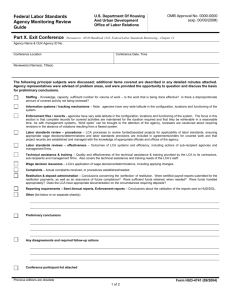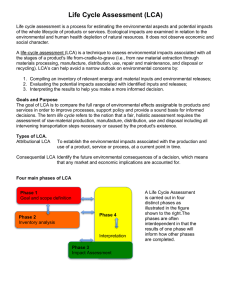LCA Breast CMF EBC November 2014
advertisement

Breast Pathway Group – CMF (oral or IV): Cyclophosphamide / Methotrexate / Fluorouracil in Early Breast Cancer Indication: Neoadjuvant or Adjuvant treatment for high risk breast cancer Regimen details: CMF ORAL Cyclophosphamide Cyclophosphamide Administration: 100mg/m2 once daily PO Days 1 to 14 OR 200mg / 150mg on alternate days PO Days 1 to 14 5-Fluorouracil Methotrexate 600mg/m2 40mg/m2 IV IV Day 1 & Day 8 Day 1 & Day 8 CMF IV Cyclophosphamide Methotrexate 5-Fluorouracil 600 mg/m2 40 mg/m2 600 mg/m2 IV IV IV Day 1 & Day 8 Day 1 & Day 8 Day 1 & Day 8 Cyclophosphamide tablets orally, swallow whole with water. Cyclophosphamide available as 50mg tablets. Cyclophosphamide IV may be administered as an IV bolus injection via a fast-running Sodium Chloride 0.9% infusion or a short infusion e.g. in 100 – 250ml Sodium Chloride 0.9% over 30 minutes. 5-Fluorouracil IV bolus injection via a fast-running Sodium Chloride 0.9% infusion Frequency: Every 28 days for up to 6 cycles Pre-medication: Not routinely required Version: 1.0 Supersedes: all other versions Approved by LCA Breast Pathway Chemotherapy Lead: Mark Harries Reason for Update: LCA Protocol Development Approved by LCA Joint Delivery Subgroup Co-Chairs: Pauline McCalla & Rebecca Johl Prepared by: Approved by LCA Medicines & Chemotherapy Steering Group Chair: Jamie Ferguson Lisa Yuen Second check by: Laura Cameron Date prepared: November 2014 Review Date: November 2016 Disclaimer: The Joint Delivery Chemotherapy Nurse/Oncology Pharmacist Group is a sub-group of the Medicines & Chemotherapy Steering Group (MCSG) working within the London Cancer Alliance Integrated Cancer System (LCA). The output of the LCA MCSG includes documentation that can be adopted by healthcare organisations at their discretion. It is the responsibility of each individual organisation to ensure that appropriate governance and safety clearance procedures within their own clinical service have been followed prior to implementation of any such pieces of work. LCA assume no responsibility for this process within individual organisations, and no responsibility for the clinical management of individual patients or patient groups. Any clinical queries regarding individual patients or documentation should be directed to the relevant clinical team within the most appropriate healthcare organisation. ©LCA Copyright 2014 Breast Pathway Group – CMF (oral or IV): Cyclophosphamide / Methotrexate / Fluorouracil in Early Breast Cancer Anti- emetics: Moderate emetogenicity Follow Local Anti-emetic Policy Supportive medication: Folinic acid rescue 15mg PO 6 hourly x 6 doses, starting 24 hours post methotrexate on Day 1 & Day 8 (only required for patients with toxicities such as mucositis, sore eyes, diarrhoea or severe renal impairment or “third-space” fluid collection – see Comments) Diarrhoea can be managed with loperamide GCSF as per local policy Mouthcare as per local policy Extravasation: Non-vesicants Regular investigations: Prior to cycle 1 FBC LFTs U&Es Day 1 (within 14 days) Day 1 (within 14 days) Day 1 (within 14 days) Prior to Day 8 (all cycles): FBC Day 8 (within 48 hours) Prior to Day 1 (all cycles): FBC LFTs U&Es CT scan Day 1 (within 72 hours) Day 1 (within 72 hours) Day 1 (within 72 hours) Every 3 cycles Toxicities: Myelosuppression, risk of sepsis and thrombocytopenia, nausea, vomiting, diarrhoea (possibly constipation), mild alopecia, taste disturbance, fatigue, mucositis, long term risk of early menopause DOSE MODIFICATIONS Haematological Toxicity Neutrophils (x 109/L) ≥ 1.0 < 1.0 Version: 1.0 & or Platelets (x 109/L) ≥ 100 < 100 Supersedes: all other versions Dose 100% dose Delay for 1 week Repeat FBC, if recovered to above these levels resume treatment at 100% dose. Approved by LCA Breast Pathway Chemotherapy Lead: Mark Harries Reason for Update: LCA Protocol Development Approved by LCA Joint Delivery Subgroup Co-Chairs: Pauline McCalla & Rebecca Johl Prepared by: Approved by LCA Medicines & Chemotherapy Steering Group Chair: Jamie Ferguson Wendy Ng Second check by: Laura Cameron Date prepared: November 2014 Review Date: November 2016 Disclaimer: The Joint Delivery Chemotherapy Nurse/Oncology Pharmacist Group is a sub-group of the Medicines & Chemotherapy Steering Group (MCSG) working within the London Cancer Alliance Integrated Cancer System (LCA). The output of the LCA MCSG includes documentation that can be adopted by healthcare organisations at their discretion. It is the responsibility of each individual organisation to ensure that appropriate governance and safety clearance procedures within their own clinical service have been followed prior to implementation of any such pieces of work. LCA assume no responsibility for this process within individual organisations, and no responsibility for the clinical management of individual patients or patient groups. Any clinical queries regarding individual patients or documentation should be directed to the relevant clinical team within the most appropriate healthcare organisation. ©LCA Copyright 2014 Breast Pathway Group – CMF (oral or IV): Cyclophosphamide / Methotrexate / Fluorouracil in Early Breast Cancer In neoadjuvant/adjuvant treatment, dose reduction and delays can compromise outcome. GCSF should be considered if more than one delay and/or before dose reduction. If in doubt, seek Consultant advice. If during the preceding cycle, the patient has experienced neutrophils < 0.5 x 10 9/L or has febrile neutropenia diagnosed, GCSF should be considered. If despite GCSF treatment, febrile neutropenia occurs or a dose delay is required - seek Consultant advice and consider dose reduction by 25% If platelets persistently < 100 x 109/L on Day 1 despite dose delay - seek Consultant advice and consider dose reduction by 25% Non-haematological Toxicities Renal Impairment Creatinine Clearance (ml/ml) >80 60-80 30-60 20-30 10-20 <10 Cyclophosphamide Dose 100% 100% 100% 100% 75% Discuss with consultant and consider 50% dose Methotrexate Dose Fluorouracil Dose 100% 65% 50% Omit Omit Omit 100% 100% 100% 80% 80% Omit Hepatic Impairment Bilirubin (µmol/L) 24-50 51-85 Any >85 AST / ALT (Units) <180 Any > 180 Any & & & & Methotrexate Dose Fluorouracil Dose 100% 75% 75% Omit 100% 100% Omit Omit Cyclophosphamide is not recommended in patients with bilirubin >17 µmol/L or AST/ALT more than 2-3 x ULN, however, exposure to active metabolites may not be increased, therefore a dose reduction may not be necessary. Decision should be discussed with the Consultant. Location of regimen delivery: Version: 1.0 Outpatient setting Supersedes: all other versions Approved by LCA Breast Pathway Chemotherapy Lead: Mark Harries Reason for Update: LCA Protocol Development Approved by LCA Joint Delivery Subgroup Co-Chairs: Pauline McCalla & Rebecca Johl Prepared by: Approved by LCA Medicines & Chemotherapy Steering Group Chair: Jamie Ferguson Wendy Ng Second check by: Laura Cameron Date prepared: November 2014 Review Date: November 2016 Disclaimer: The Joint Delivery Chemotherapy Nurse/Oncology Pharmacist Group is a sub-group of the Medicines & Chemotherapy Steering Group (MCSG) working within the London Cancer Alliance Integrated Cancer System (LCA). The output of the LCA MCSG includes documentation that can be adopted by healthcare organisations at their discretion. It is the responsibility of each individual organisation to ensure that appropriate governance and safety clearance procedures within their own clinical service have been followed prior to implementation of any such pieces of work. LCA assume no responsibility for this process within individual organisations, and no responsibility for the clinical management of individual patients or patient groups. Any clinical queries regarding individual patients or documentation should be directed to the relevant clinical team within the most appropriate healthcare organisation. ©LCA Copyright 2014 Breast Pathway Group – CMF (oral or IV): Cyclophosphamide / Methotrexate / Fluorouracil in Early Breast Cancer Comments: Fluorouracil Cardiotoxicity has been associated with fluoropyrimidine therapy, including myocardial infarction, angina, dysrhythmias, cardiogenic shock, sudden death and electrocardiographic changes. These adverse events may be more common in patients with a prior history of coronary artery disease. Caution must be exercised in patients with history of significant cardiac disease, arrhythmias and angina pectoris. Dihydropyrimidine dehydrogenase (DPD) deficiency can result in severe toxicity secondary to reduced metabolism of fluorouracil. Ensure patient is informed of action to take if signs of toxicity (e.g. severe mucositis, diarrhoea) develop within the first few days of treatment, as this is often an early indication of DPD deficiency. Methotrexate If the patient has a “third-space” fluid collection (ascites, effusion or extensive oedema) or significant renal impairment or toxicities such as mucositis, sore eyes or diarrhoea, the elimination of methotrexate may be prolonged, enhancing its toxicity. Seek Consultant advice and consider folinic acid rescue in such cases (ensure it is charted to start 24 hours after methotrexate) Acute or chronic interstitial pneumonitis, often associated with blood eosinophilia, may occur with methotrexate and deaths have been reported. Symptoms typically include dyspnoea, cough (especially a dry non-productive cough) and fever for which patients should be monitored at each follow-up visit. Hepatotoxicity, including hepatitis and cirrhosis, has been associated with methotrexate. It is imperative that hepatic function be determined prior to initiation of treatment and monitored regularly throughout therapy. Drug interactions: Version: 1.0 Significant interactions below. For full details consult product literature/reference texts. Warfarin/coumarin anticoagulants: elevations in INR have been reported in patients taking warfarin and receiving fluorouracil. Patients should be switched to low molecular weight heparin for the duration of therapy. Folinates: Folinic acid enhances the toxicity of fluorouracil and reduces the maximum tolerated dose. It is possible that folic acid has the same effect. Avoid concomitant use. Supersedes: all other versions Approved by LCA Breast Pathway Chemotherapy Lead: Mark Harries Reason for Update: LCA Protocol Development Approved by LCA Joint Delivery Subgroup Co-Chairs: Pauline McCalla & Rebecca Johl Prepared by: Approved by LCA Medicines & Chemotherapy Steering Group Chair: Jamie Ferguson Wendy Ng Second check by: Laura Cameron Date prepared: November 2014 Review Date: November 2016 Disclaimer: The Joint Delivery Chemotherapy Nurse/Oncology Pharmacist Group is a sub-group of the Medicines & Chemotherapy Steering Group (MCSG) working within the London Cancer Alliance Integrated Cancer System (LCA). The output of the LCA MCSG includes documentation that can be adopted by healthcare organisations at their discretion. It is the responsibility of each individual organisation to ensure that appropriate governance and safety clearance procedures within their own clinical service have been followed prior to implementation of any such pieces of work. LCA assume no responsibility for this process within individual organisations, and no responsibility for the clinical management of individual patients or patient groups. Any clinical queries regarding individual patients or documentation should be directed to the relevant clinical team within the most appropriate healthcare organisation. ©LCA Copyright 2014 Breast Pathway Group – CMF (oral or IV): Cyclophosphamide / Methotrexate / Fluorouracil in Early Breast Cancer NSAIDS: may reduce renal excretion of methotrexate (increased risk in those with renal impairment). Monitor renal function & FBC if used concomitantly. Probenicid: Increases methotrexate toxicity. Avoid. Antibacterials: Penicillins, doxycycline, tetracyclines, sulphonamides & ciprofloxacin may reduce methotrexate clearance. Monitor FBC. Co-trimoxazole/trimethoprim: Increases antifolate effect. Avoid if possible. If must be used, monitor FBC. Retinoids: Increased risk of hepatotoxicity. Avoid. References: Jodrell DI et al. Br J Cancer (1991) May; 63(5):794-798 Fisher et al., (1990); JCO, Vol 8:pp 2483-96 Tancini et al., (1983); JCO, Vol 1:pp 2-10 Bonadonna et al., (1976); Vol 294:pp 405-10 UCLH- Dosage Adjustment for Cytotoxics in Renal Impairment. Jan 2009 UCLH- Dosage Adjustment for Cytotoxics in Hepatic Impairment. Jan 2009 LCA Breast Cancer Clinical Guidelines October 2013 Version: 1.0 Supersedes: all other versions Approved by LCA Breast Pathway Chemotherapy Lead: Mark Harries Reason for Update: LCA Protocol Development Approved by LCA Joint Delivery Subgroup Co-Chairs: Pauline McCalla & Rebecca Johl Prepared by: Approved by LCA Medicines & Chemotherapy Steering Group Chair: Jamie Ferguson Wendy Ng Second check by: Laura Cameron Date prepared: November 2014 Review Date: November 2016 Disclaimer: The Joint Delivery Chemotherapy Nurse/Oncology Pharmacist Group is a sub-group of the Medicines & Chemotherapy Steering Group (MCSG) working within the London Cancer Alliance Integrated Cancer System (LCA). The output of the LCA MCSG includes documentation that can be adopted by healthcare organisations at their discretion. It is the responsibility of each individual organisation to ensure that appropriate governance and safety clearance procedures within their own clinical service have been followed prior to implementation of any such pieces of work. LCA assume no responsibility for this process within individual organisations, and no responsibility for the clinical management of individual patients or patient groups. Any clinical queries regarding individual patients or documentation should be directed to the relevant clinical team within the most appropriate healthcare organisation. ©LCA Copyright 2014




